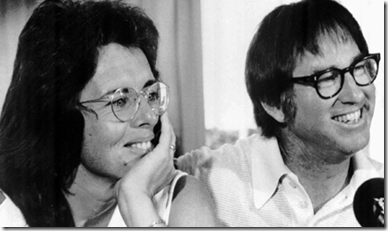If Bobby Riggs intentionally lost to Billie Jean King in The Battle of the Sexes, it matters. The truth always matters.
/ESPN recently ran a feature story about the allegation that Bobby Riggs intentionally lost the famous 1973 Battle of the Sexes match against Billie Jean.
I’ve read the piece and then listened to the writer discuss it on a podcast.
Am I convinced that it’s true?
No. But I think there’s a possibility that it’s true.
Amanda Marcotte of Slate responded to the piece with one of her own entitled Did Bobby Riggs Throw His Match Against Billie Jean King? It Doesn’t Matter.
I can’t imagine a more ridiculous title or a worse premise.
Of course it matters. The truth always matters. Even when the truth may damage your cause or harm your narrative, it should always be sought.
In this case, however, the discovery that Riggs threw the match would not change the course or the perception of feminism in any way. In fact, I would argue that Marcotte’s piece does far more damage to feminism than the revelation that Bobby Riggs may have intentionally lost to Billie Jean King. It lends credence and weight to something that is no longer relevant. It implies that the feminist narrative is still dependent on King’s defeat of Riggs, even while she claims that the truth about the match “doesn’t matter.”
Marcotte’s initial argument is that even if it were true that Riggs threw the match, it wouldn’t matter. Just because male athletes can jump higher and run faster than female athletes doesn’t mean that women should be paid less for the same work that men do or be any less entitled to affordable daycare.
Of course this is true. We all know this to be true. Even the most ardent, angry sexist would be hard pressed to argue that women should be paid less than men because they can’t jump as high. At no time in the history of the universe has this claim been made by even the most idiotic sexist.
You don’t earn points for stating the obvious.
But it’s Marcotte’s ridiculous knee-jerk reaction to these allegations about an event that took place 40 years ago that risks lending credibility to something that should have absolutely to bearing on feminism at all.
Is the feminist narrative really so dependent upon a 55 year-old retired professional tennis player losing a match to a 30 year-old female professional at the top of her game?
I hope not.
And has it been forgotten that this same 55 year-old retiree had already defeated 28 year-old Margaret Court, the #1 ranked women’s tennis player in the world at the time, just four months earlier?
In truth, The Battle of the Sexes was was hardly a feminist victory. At best it was a tie, and if you factor in age, it’s hard to argue that Riggs’ loss was a boost for feminism at all.
Marcotte goes on to predict that after reading this ESPN story:
Every single embittered, sexist man in the country—every Fox viewer, every Limbaugh fan, every visitor to Ask Men—is going to eagerly forward this story to every guy he knows, chortling triumphantly that this finally proves that women are in fact the weaker sex.
Does she really believe that there are hordes of embittered, sexist men in this country still stinging over a tennis match that was played more than forty years ago?
Even if there were men still looking for vindication as Marcotte seems to believe, don’t you think they would’ve already found solace in the age disparity between Billie Jean King and Bobby Riggs? Riggs was more than a quarter-century older than his female opponents, and he defeated one of them (and according to the tennis rankings at the time, the better one) easily.
Marcotte is crazy if she thinks this potential revelation would even be a blip on the sexist radar.
I realize that Marcotte’s intention was to say that this tennis match has no bearing on feminism today, and she is right. It doesn’t.
But to assume that sexist men are still angry about this match is ridiculous.
To state that the truth behind the Battle of the Sexes doesn’t matter is equally silly.
